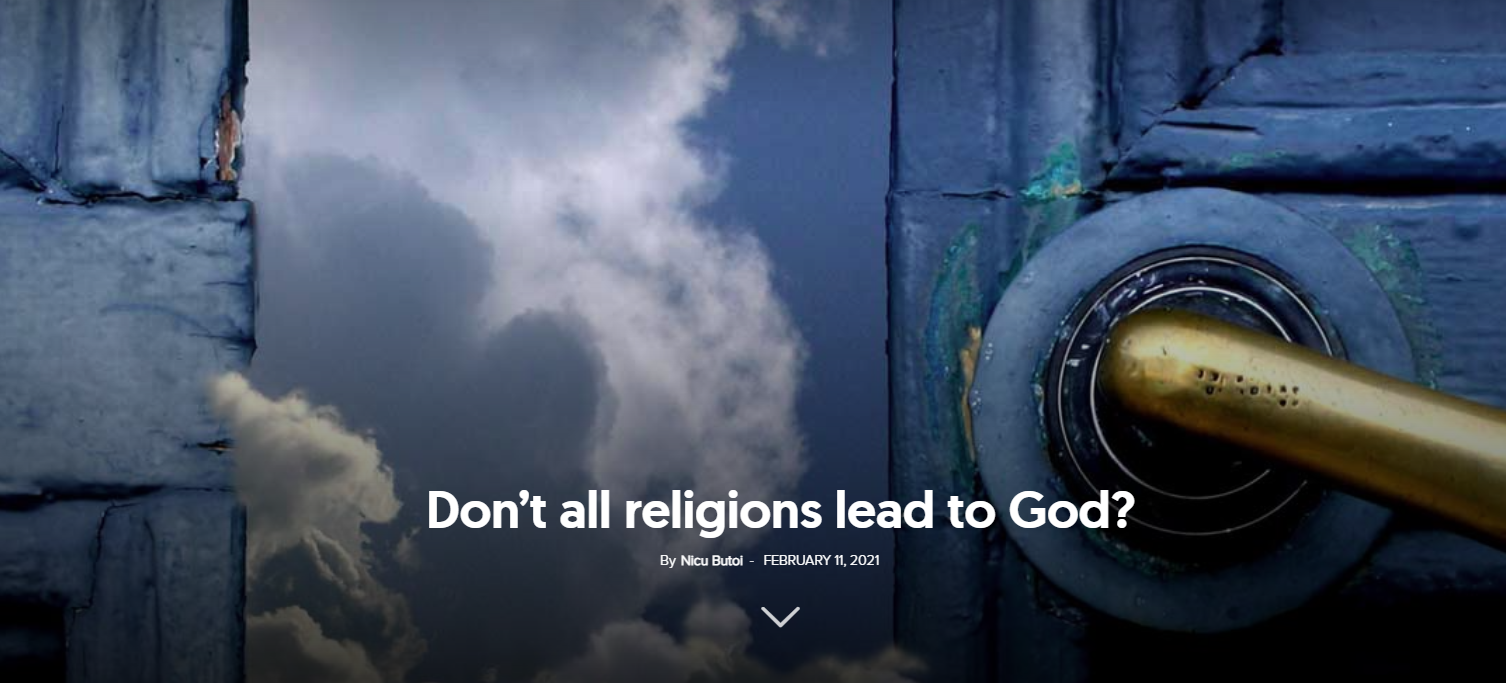Globally there are 19 major religions, divided in turn into 10,000 religious groups. Each group claims to be the holder of the Truth. If one of them really holds the Truth, that means there are about 9,999 false religious groups.
Therefore, the individual chances of belonging to a false religion are very high indeed. However, there are voices according to which all religions lead you to God or to that Mystery that transcends tangible reality, the only difference being that they do this in different ways.
In other words, in every corner of the world, people nurture this feeling of the ineffable in more or less similar forms, and regardless of the chosen religion, the outcome is the same. Some have come to call themselves Christians, others Muslims, Buddhists or Hindus, but, in essence—according to the followers of religious pluralism—all religions teach you to be good, to find your balance and meaning in life and, consequently, they are all…good.
Guilty?
Especially in Western societies, the debate regarding the purpose and place of religion in the public space brings to light, through the anti-religious discourse, numerous negative examples from the history of various religions and, in particular, Christianity. Those who wish to “purify” the public space of any religious influence list episodes such as the Spanish Inquisition, the Calvinist dictatorship in Geneva, the Puritans in the New World persecuting those who had different beliefs than them, etc.
Combined with political power, religion (Christian or otherwise) has repeatedly led to serious violations of freedom of conscience and more. In fact, almost all religions, once they became the majority in a certain geographical area, have had the opportunity to demonstrate their persecutory potential.
Regardless of the religious group you look at, you will also find hypocrisy, reprehensible deeds, dishonesty, hidden interests, lies, etc. Christians accuse Muslims of acts of violence. Buddhists can accuse Christians of bloody wars in the name of religion.
Evaluating a religion—any religion—through the lens of its history and the deeds committed in its name can lead to an unpleasant conclusion: no religion is true because each can be associated with negative people, deeds, and realities.
If you read in the Bible the commandment to love your enemy and overcome evil with good, you can draw a conclusion about Christianity. If you look at the crimes committed by some in the name of Christ, you can draw the complete opposite conclusion about the same religion. That is why the evaluation of a religion must first of all take into account the principles and ideas that shape it. The way religions have been misused by people and groups with various agendas is not the criterion by which true religion can be identified.
On the other hand, it is worth emphasising that removing religion from the public space has never been a guarantee of respect for individual rights and freedoms. This was clearly demonstrated by the communist regime, in which atheism, raised to the rank of state policy, was perfectly combined with flagrant and brutal violations of human rights.
Do differences matter?
The true search for the authentic religion will inevitably place before the seeker a categorical reality: there are colossal differences between the world’s great religions. First, while some religions are monotheistic, others involve the worship of a multitude of deities.
Then, the nature of the various gods is, again, different. Christians believe that God is a real, intelligent, omnipotent Being. In other religions, there is no deity. Differences also exist at the level of conceptions regarding life after death. Merging with the Infinite, travelling to Heaven or Hell, resurrection, transmigration of the soul, reincarnation, withdrawal of the spirit into extrasensory dimensions, oscillation of the soul between the material and the spiritual world—these are just a few examples of what the religious space has to offer.
Depending on the religion to which an individual belongs, they can have the most varied conceptions, beliefs, and practices regarding family life, sex, contraception, physical appearance, clothing, relations with members of other religious groups, the origin of the human, the purpose of the human being, social roles, the relationship between men and women, raising and educating children, etc. Underlining the differences between religions, here is an example of a major difference between Christianity and other religions: while many religions support the idea of salvation being through works, rituals, methods of going within, etc., Christianity states that salvation through works is not possible because it is a gift from God.
The conclusion is simple. The differences are so numerous and, sometimes, so great, that it cannot be said that being a Christian and being a Buddhist are the same and that, regardless of the religion you choose, you will reach the same endpoint. The differences therefore require evaluation, selection, and conscious choice of a certain religion.
But what if I was born into it?
Someone born in India has a high chance of being a Hindu, but if they were born in Saudi Arabia, they would have a higher chance of being a Muslim. A person born in Romania has a good chance of belonging to the Christian Orthodox Church.
Many who are educated in a certain religious tradition embrace it and may honestly believe that it is the true religion. Most of the time, the members of a religion have not even questioned and evaluated their own religion. The simple fact that their parents or grandparents directed them from childhood to a certain church, synagogue, temple, or mosque seems to be enough to believe that it is the right choice.
The question that arises is the following: What is more honest? To embrace a religion just because it is the religion of your parents, or to do “market” research and choose a religion as a result of a rigorous evaluation and selection process?
The only religion that matters…
“If you are a Christian you do not have to believe that all the other religions are simply wrong all through,” [1] Christian apologist C. S. Lewis says. Similarly, if you are a Muslim or a Hindu, you must not assume that all other religions are completely wrong. Any religion can contain a grain of truth. However, this is not enough to choose and dedicate your life to a religion.
Religion penetrates so deeply into the privacy of individual life that its choice should be considered a priority and one of the most important, if not the most important choice we make in the course of our life, because all the other choices we make depend on it.
In a world where communication barriers seem to no longer exist and where information has become a public good, knowing the astonishing and immense diversity of the contemporary religious landscape can trap us into the hasty conclusion that there is no true religion.
Is it possible for a certain religious group to hold the Truth, while the rest of humanity, meaning billions of people, is mistaken?
This is a good question for which one can hardly give an answer that satisfies all the demands of rational evidence. But a counter-question can be raised: Does it make sense to belong to a religion if you do not have a firm inner conviction that that religion is the true one?
Many, most or perhaps even all religions are good, in the sense that they can bring various benefits to the individual’s life through the ethical codes they impose. But at the same time not all religions are good, since the only religion that matters…is the true one, the one that gives the right answers to existential questions, the one that places you in the right position regarding Life and Death, the one that connects you in a real way with the Source of life.
Florin Bică is a children’s book author, writing both fiction and non-fiction for this exacting audience.




















